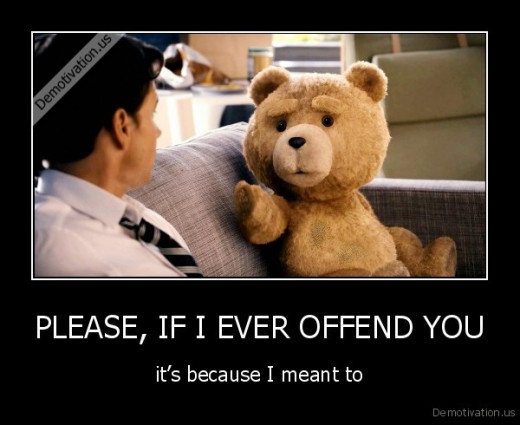Moral Critique of Law #19: The 48 Laws of Power
Law #19. Know who you're dealing with - Do not offend the wrong person
"There are many different kinds of people in the world, and you can never assume that everyone will react to your strategies in the same way. Deceive or outmaneuver some people and they will spend the rest of their lives seeking revenge. They are wolves in lamb's clothing. Choose your victims and opponents carefully, then - never offend or deceive the wrong person.
I read the book The 48 Laws of Power out of a curiosity and a hunger for something greater for myself. What I found was a book that could be seen as ruthless and manipulative in it's principles. I have decided to write a series of critiques of each of the laws. I will discuss the good and the bad of the law as well as a key that I've found to upholding the law without losing your morality.
I will now dissect Law #19.

Summary of Law
In this law, Robert Greene distinguishes between "opponents", "suckers" and "victims". He outlines five most "dangerous and difficult types of mark" one can deal with. These are:
- The Arrogant and Proud Man
- The Hopelessly Insecure Man
- Mr. Suspicion
- The Serpent with a Long Memory
- The Plain, Unassuming and Often Unintelligent Man
These, being the types of people one should beware of when choosing the right people to coerce and manipulate to your own ends in your pursuit for power.
In the book, Greene pointed out various transgressions of the law that resulted in master con-artists, salesmen and rulers being pursued relentlessly by their victims to exact revenge or having their time wasted without any reward.
For these reasons, Greene cautions readers to avoid tangling with these types.

The Good
There is a lot of good to be said for not offending people. Using caution when you are dealing with others is just a smart move, period. It is a fact that some people get frustrated by what seems to be an overly-restricting culture that doesn't allow many to express themselves, but in fact this is not the case. There are many avenues (here in America) for one to express themselves freely. People who do stand up comedy say pretty much whatever they want at the risk of getting heckled. The internet also results in people speaking freely. However, as pointed out with comedians, there is a risk involved.
The description of this law is right in outlining that there are some people who are not good to offend in whatever way. For one's own safety and/or sanity, it is just smart to steer clear of these people when engaging in behaviors that could be considered offensive or hurtful.
The fact is, that some people will let offenses, from slight to grievous, go. Some people just let things slide. However, one should not take the few people who find crude jokes funny, or don't laugh off deceit represent in their minds how everyone behaves or should operate.
It's just a good thing to know and understand the people you are dealing with and what offends them which is mostly what this law tries to convey. "Feeling people out" and getting to know them is not only smart, but considerate. Some ways to find out what people are offended by are:
- Asking
- Hinting about an opinion of yours and paying attention to their reaction
- Being observant of body language
Offensive things were meant to offend. Some things that can be considered universally offensive things are:
- Crude jokes involving race, religion, politics, foul language and/or "toilet humor"
- Deceit in all forms
- Violence
- Aggressive behavior
There may be a few other things in this world that offend, but these are the main ones.
I am suspicious of those in America who feel that they are being restricted from being offensive. My belief is that it is the permissive nature of this society which encourages people to speak their mind no matter how offensive, that results in offense being rightly taken and confusion is the result, because those being offensive wonder why offense was taken from something which is their right. I will address how to deal with such an incident in "The Key".
For this reason, I believe that Greene pointing out that there is a danger in being offensive is a credit to this book. Those pursuing power can often be blinded by ambition to the point where they are oblivious to how their behavior affects others. There is an old adage that says: "Be careful of who you step on to get up, because you will see them on your way down." Whether or not you're seeing them because they are the one that brought you down is a matter of who they are and whether or not your stepping on them was perceived as offensive!
The Bad
There are some morally questionable aspects to this law as well. The most glaring being that it doesn't not encourage one to not be offensive, but it cautions them to be discriminatory about those they offend. I think this is erroneous thinking, because there is a saying that goes "what's done in the dark will come to light". This is a reason to be wary of your behavior at all times. Law #5 actually says that you should guard your reputation at all costs. A huge indicator of one's standing reputation-wise is whether or not people are offended by you. So, why risk it? Why risk those you engage with spreading information about who you are in private (i.e. if you tell rude and offensive jokes, etc.)? Why risk having a slip of the tongue in public and saying something offensive in the wrong company.
The fact of the matter is that "out of the abundance of the heart, the mouth speaks". So, if you are saying rude and offensive things, chances are that you believe them; and if you believe them, chances are, you'll say them again. The chances that you'll say them to wrong person are greatly increased in cases when you say them freely in any circumstance.

Keys to Power
- Do not be offensive
- If you are offensive, apologize and let it go
- Feel people out to figure out if they are offended and what they are offended by
- Do not repeat the offense
- Every time you learn what offends, take it as a learning experience not an affront on your character
When people are offended by you how have you reacted in the past?
The Key
The number one key to observing this law (with or without moral uprightness) is to not be offensive. Just don't make offensive jokes and/or do universally offensive things. Chances are if you do something that is specific to your own culture that is not universally offensive, others will understand that it is simply a cultural thing once you explain it to them.
That being said, sometimes people will be offended by you whether or not you intend to be offensive. Some cultures just have practices in them that are considered offensive to others. In these cases, the best thing you can do if you offend someone is apologize and let it go. Do not be angry or argue about whether or not they should be offended by your remark or action.
Another important key is to try to feel people out to figure out what they are offended by. That is at the core of this law. Essentially, Greene is saying that you should know how to deal with people. There are countless books that teach you how to deal with those around you. The most popular being The Bible. Some others are: "How to Have Confidence and Power in Dealing with People" and "How to Win friends and Influence People". If you have never been a "people person", these are great books to read, especially if you are on a quest for power. The fact is, you are going to have to engage with people throughout your power quest. So, learn all you can about how to deal with others in a effective manner.








